Analysis of Commercial Bank of Australia Ltd v Amadio Case Law
VerifiedAdded on 2023/01/18
|7
|1762
|98
Case Study
AI Summary
This case study analyzes the landmark case of Commercial Bank of Australia Ltd v Amadio (1983), focusing on the issue of unconscionable conduct. The case involved an elderly Italian immigrant couple, the Amadios, who signed a guarantee for their son's construction business. The bank, aware of the couple's limited English proficiency and business understanding, failed to disclose crucial information. When the son's business failed, the bank sought to enforce the guarantee, leading the Amadios to argue unconscionable conduct. The court found in favor of the Amadios, emphasizing their special disadvantage and the bank's exploitation of this vulnerability. The judges, including Mason and Deane, highlighted the importance of informed consent and fair dealings in contracts. The court determined that the bank had a duty to ensure the Amadios understood the terms of the agreement and that the bank's failure to do so constituted unconscionable conduct. The case established principles regarding unconscionable conduct, protecting consumers from unfair practices and influencing subsequent legal interpretations of contract law.
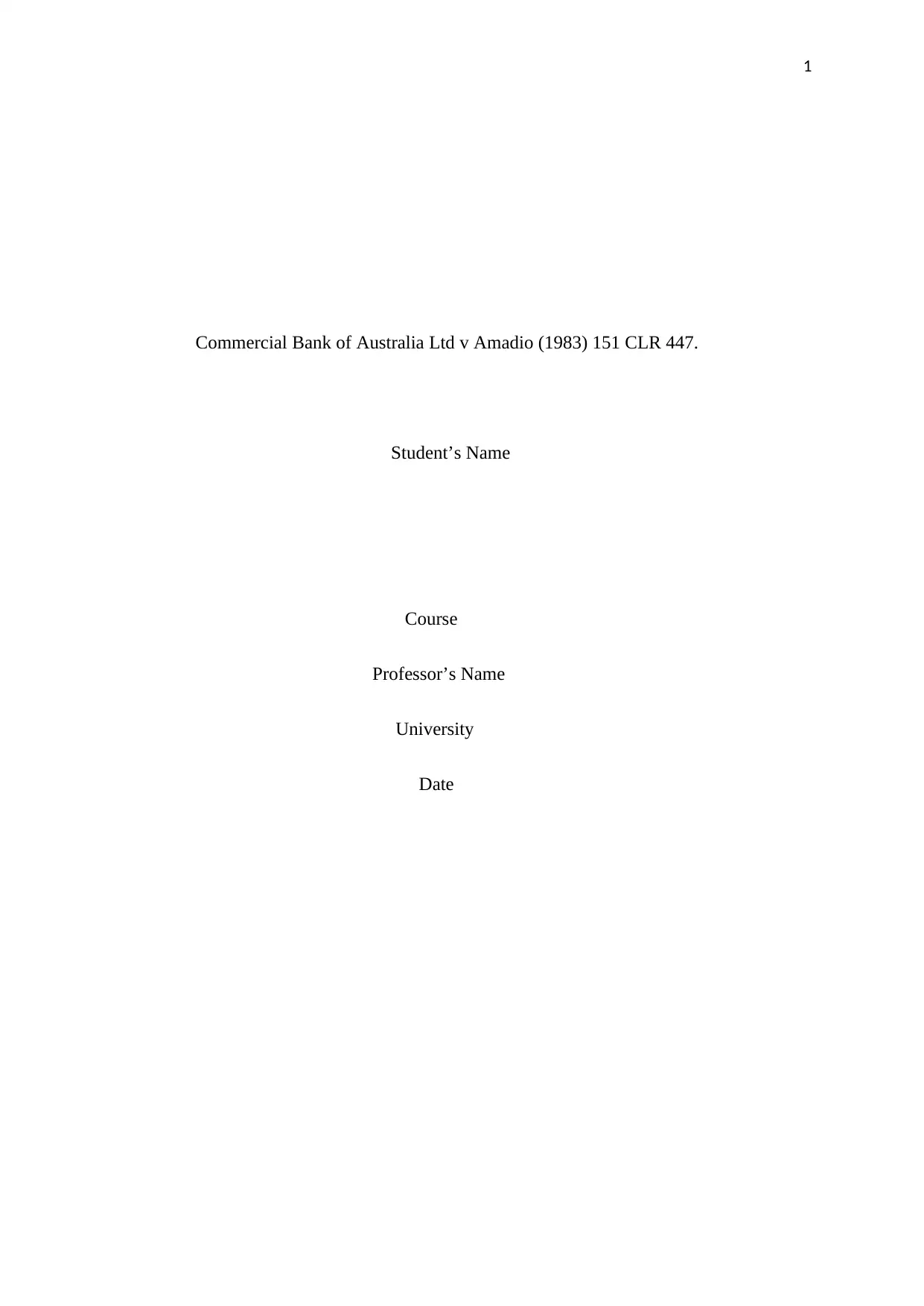
1
Commercial Bank of Australia Ltd v Amadio (1983) 151 CLR 447.
Student’s Name
Course
Professor’s Name
University
Date
Commercial Bank of Australia Ltd v Amadio (1983) 151 CLR 447.
Student’s Name
Course
Professor’s Name
University
Date
Paraphrase This Document
Need a fresh take? Get an instant paraphrase of this document with our AI Paraphraser
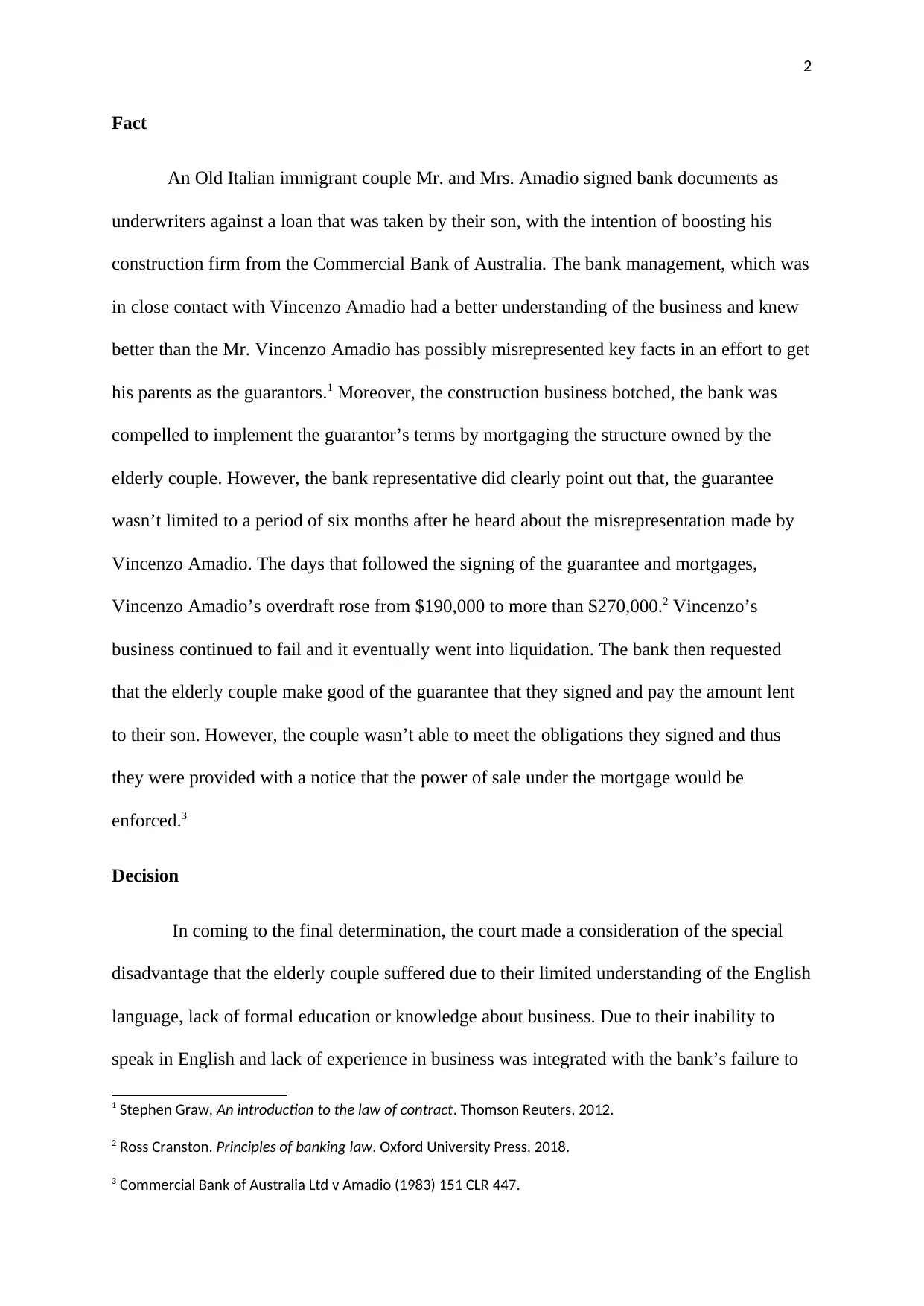
2
Fact
An Old Italian immigrant couple Mr. and Mrs. Amadio signed bank documents as
underwriters against a loan that was taken by their son, with the intention of boosting his
construction firm from the Commercial Bank of Australia. The bank management, which was
in close contact with Vincenzo Amadio had a better understanding of the business and knew
better than the Mr. Vincenzo Amadio has possibly misrepresented key facts in an effort to get
his parents as the guarantors.1 Moreover, the construction business botched, the bank was
compelled to implement the guarantor’s terms by mortgaging the structure owned by the
elderly couple. However, the bank representative did clearly point out that, the guarantee
wasn’t limited to a period of six months after he heard about the misrepresentation made by
Vincenzo Amadio. The days that followed the signing of the guarantee and mortgages,
Vincenzo Amadio’s overdraft rose from $190,000 to more than $270,000.2 Vincenzo’s
business continued to fail and it eventually went into liquidation. The bank then requested
that the elderly couple make good of the guarantee that they signed and pay the amount lent
to their son. However, the couple wasn’t able to meet the obligations they signed and thus
they were provided with a notice that the power of sale under the mortgage would be
enforced.3
Decision
In coming to the final determination, the court made a consideration of the special
disadvantage that the elderly couple suffered due to their limited understanding of the English
language, lack of formal education or knowledge about business. Due to their inability to
speak in English and lack of experience in business was integrated with the bank’s failure to
1 Stephen Graw, An introduction to the law of contract. Thomson Reuters, 2012.
2 Ross Cranston. Principles of banking law. Oxford University Press, 2018.
3 Commercial Bank of Australia Ltd v Amadio (1983) 151 CLR 447.
Fact
An Old Italian immigrant couple Mr. and Mrs. Amadio signed bank documents as
underwriters against a loan that was taken by their son, with the intention of boosting his
construction firm from the Commercial Bank of Australia. The bank management, which was
in close contact with Vincenzo Amadio had a better understanding of the business and knew
better than the Mr. Vincenzo Amadio has possibly misrepresented key facts in an effort to get
his parents as the guarantors.1 Moreover, the construction business botched, the bank was
compelled to implement the guarantor’s terms by mortgaging the structure owned by the
elderly couple. However, the bank representative did clearly point out that, the guarantee
wasn’t limited to a period of six months after he heard about the misrepresentation made by
Vincenzo Amadio. The days that followed the signing of the guarantee and mortgages,
Vincenzo Amadio’s overdraft rose from $190,000 to more than $270,000.2 Vincenzo’s
business continued to fail and it eventually went into liquidation. The bank then requested
that the elderly couple make good of the guarantee that they signed and pay the amount lent
to their son. However, the couple wasn’t able to meet the obligations they signed and thus
they were provided with a notice that the power of sale under the mortgage would be
enforced.3
Decision
In coming to the final determination, the court made a consideration of the special
disadvantage that the elderly couple suffered due to their limited understanding of the English
language, lack of formal education or knowledge about business. Due to their inability to
speak in English and lack of experience in business was integrated with the bank’s failure to
1 Stephen Graw, An introduction to the law of contract. Thomson Reuters, 2012.
2 Ross Cranston. Principles of banking law. Oxford University Press, 2018.
3 Commercial Bank of Australia Ltd v Amadio (1983) 151 CLR 447.
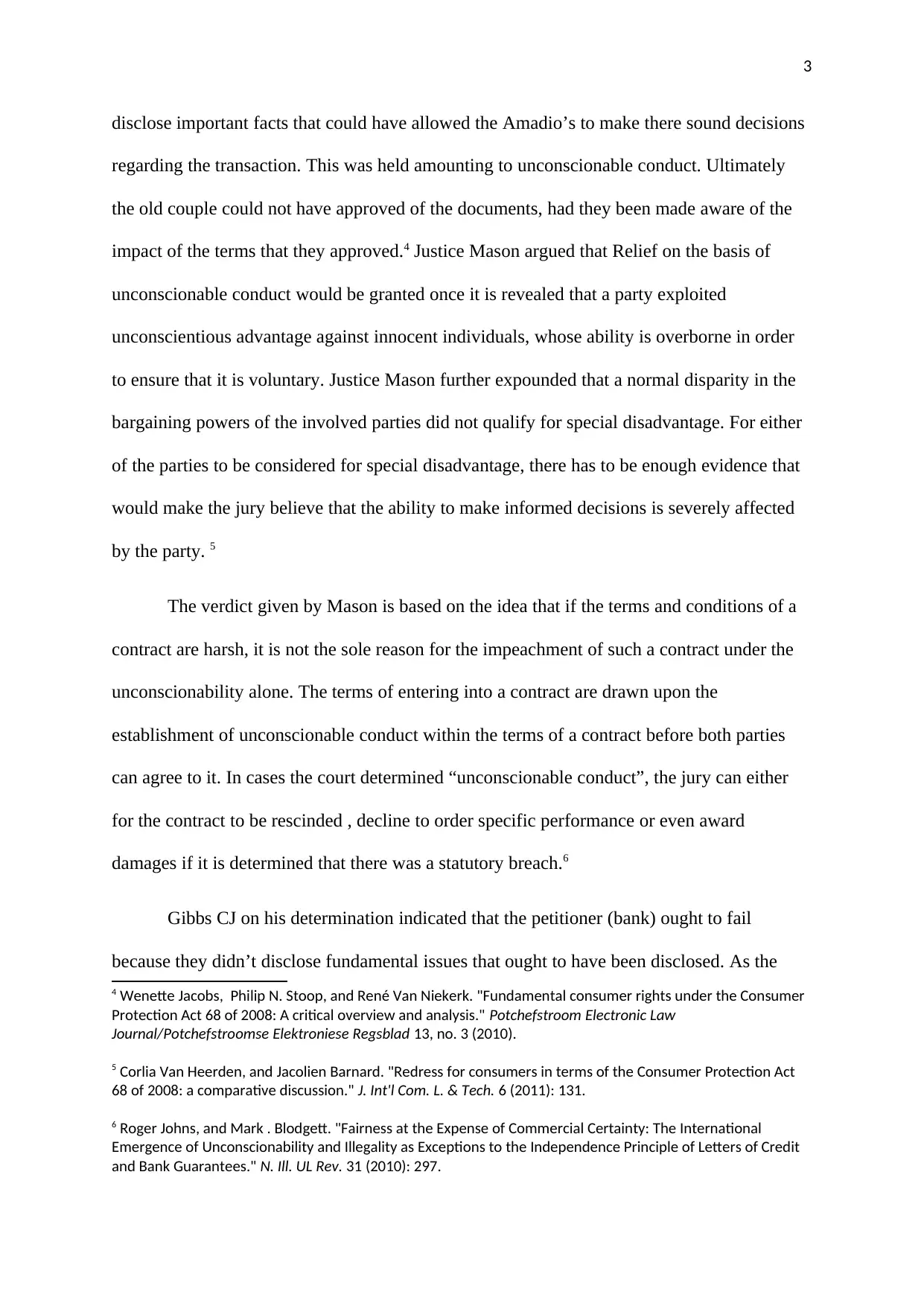
3
disclose important facts that could have allowed the Amadio’s to make there sound decisions
regarding the transaction. This was held amounting to unconscionable conduct. Ultimately
the old couple could not have approved of the documents, had they been made aware of the
impact of the terms that they approved.4 Justice Mason argued that Relief on the basis of
unconscionable conduct would be granted once it is revealed that a party exploited
unconscientious advantage against innocent individuals, whose ability is overborne in order
to ensure that it is voluntary. Justice Mason further expounded that a normal disparity in the
bargaining powers of the involved parties did not qualify for special disadvantage. For either
of the parties to be considered for special disadvantage, there has to be enough evidence that
would make the jury believe that the ability to make informed decisions is severely affected
by the party. 5
The verdict given by Mason is based on the idea that if the terms and conditions of a
contract are harsh, it is not the sole reason for the impeachment of such a contract under the
unconscionability alone. The terms of entering into a contract are drawn upon the
establishment of unconscionable conduct within the terms of a contract before both parties
can agree to it. In cases the court determined “unconscionable conduct”, the jury can either
for the contract to be rescinded , decline to order specific performance or even award
damages if it is determined that there was a statutory breach.6
Gibbs CJ on his determination indicated that the petitioner (bank) ought to fail
because they didn’t disclose fundamental issues that ought to have been disclosed. As the
4 Wenette Jacobs, Philip N. Stoop, and René Van Niekerk. "Fundamental consumer rights under the Consumer
Protection Act 68 of 2008: A critical overview and analysis." Potchefstroom Electronic Law
Journal/Potchefstroomse Elektroniese Regsblad 13, no. 3 (2010).
5 Corlia Van Heerden, and Jacolien Barnard. "Redress for consumers in terms of the Consumer Protection Act
68 of 2008: a comparative discussion." J. Int'l Com. L. & Tech. 6 (2011): 131.
6 Roger Johns, and Mark . Blodgett. "Fairness at the Expense of Commercial Certainty: The International
Emergence of Unconscionability and Illegality as Exceptions to the Independence Principle of Letters of Credit
and Bank Guarantees." N. Ill. UL Rev. 31 (2010): 297.
disclose important facts that could have allowed the Amadio’s to make there sound decisions
regarding the transaction. This was held amounting to unconscionable conduct. Ultimately
the old couple could not have approved of the documents, had they been made aware of the
impact of the terms that they approved.4 Justice Mason argued that Relief on the basis of
unconscionable conduct would be granted once it is revealed that a party exploited
unconscientious advantage against innocent individuals, whose ability is overborne in order
to ensure that it is voluntary. Justice Mason further expounded that a normal disparity in the
bargaining powers of the involved parties did not qualify for special disadvantage. For either
of the parties to be considered for special disadvantage, there has to be enough evidence that
would make the jury believe that the ability to make informed decisions is severely affected
by the party. 5
The verdict given by Mason is based on the idea that if the terms and conditions of a
contract are harsh, it is not the sole reason for the impeachment of such a contract under the
unconscionability alone. The terms of entering into a contract are drawn upon the
establishment of unconscionable conduct within the terms of a contract before both parties
can agree to it. In cases the court determined “unconscionable conduct”, the jury can either
for the contract to be rescinded , decline to order specific performance or even award
damages if it is determined that there was a statutory breach.6
Gibbs CJ on his determination indicated that the petitioner (bank) ought to fail
because they didn’t disclose fundamental issues that ought to have been disclosed. As the
4 Wenette Jacobs, Philip N. Stoop, and René Van Niekerk. "Fundamental consumer rights under the Consumer
Protection Act 68 of 2008: A critical overview and analysis." Potchefstroom Electronic Law
Journal/Potchefstroomse Elektroniese Regsblad 13, no. 3 (2010).
5 Corlia Van Heerden, and Jacolien Barnard. "Redress for consumers in terms of the Consumer Protection Act
68 of 2008: a comparative discussion." J. Int'l Com. L. & Tech. 6 (2011): 131.
6 Roger Johns, and Mark . Blodgett. "Fairness at the Expense of Commercial Certainty: The International
Emergence of Unconscionability and Illegality as Exceptions to the Independence Principle of Letters of Credit
and Bank Guarantees." N. Ill. UL Rev. 31 (2010): 297.
⊘ This is a preview!⊘
Do you want full access?
Subscribe today to unlock all pages.

Trusted by 1+ million students worldwide
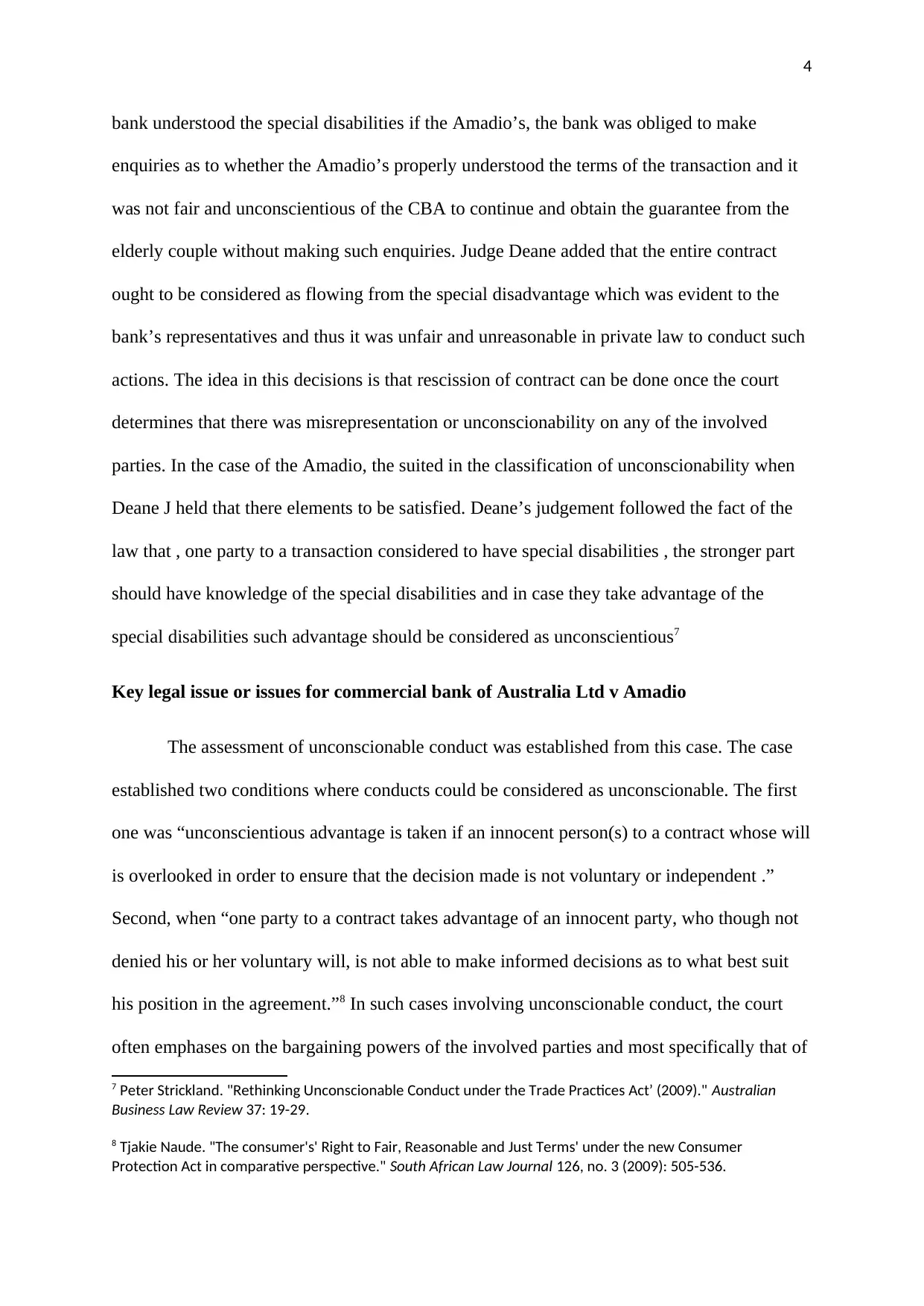
4
bank understood the special disabilities if the Amadio’s, the bank was obliged to make
enquiries as to whether the Amadio’s properly understood the terms of the transaction and it
was not fair and unconscientious of the CBA to continue and obtain the guarantee from the
elderly couple without making such enquiries. Judge Deane added that the entire contract
ought to be considered as flowing from the special disadvantage which was evident to the
bank’s representatives and thus it was unfair and unreasonable in private law to conduct such
actions. The idea in this decisions is that rescission of contract can be done once the court
determines that there was misrepresentation or unconscionability on any of the involved
parties. In the case of the Amadio, the suited in the classification of unconscionability when
Deane J held that there elements to be satisfied. Deane’s judgement followed the fact of the
law that , one party to a transaction considered to have special disabilities , the stronger part
should have knowledge of the special disabilities and in case they take advantage of the
special disabilities such advantage should be considered as unconscientious7
Key legal issue or issues for commercial bank of Australia Ltd v Amadio
The assessment of unconscionable conduct was established from this case. The case
established two conditions where conducts could be considered as unconscionable. The first
one was “unconscientious advantage is taken if an innocent person(s) to a contract whose will
is overlooked in order to ensure that the decision made is not voluntary or independent .”
Second, when “one party to a contract takes advantage of an innocent party, who though not
denied his or her voluntary will, is not able to make informed decisions as to what best suit
his position in the agreement.”8 In such cases involving unconscionable conduct, the court
often emphases on the bargaining powers of the involved parties and most specifically that of
7 Peter Strickland. "Rethinking Unconscionable Conduct under the Trade Practices Act’ (2009)." Australian
Business Law Review 37: 19-29.
8 Tjakie Naude. "The consumer's' Right to Fair, Reasonable and Just Terms' under the new Consumer
Protection Act in comparative perspective." South African Law Journal 126, no. 3 (2009): 505-536.
bank understood the special disabilities if the Amadio’s, the bank was obliged to make
enquiries as to whether the Amadio’s properly understood the terms of the transaction and it
was not fair and unconscientious of the CBA to continue and obtain the guarantee from the
elderly couple without making such enquiries. Judge Deane added that the entire contract
ought to be considered as flowing from the special disadvantage which was evident to the
bank’s representatives and thus it was unfair and unreasonable in private law to conduct such
actions. The idea in this decisions is that rescission of contract can be done once the court
determines that there was misrepresentation or unconscionability on any of the involved
parties. In the case of the Amadio, the suited in the classification of unconscionability when
Deane J held that there elements to be satisfied. Deane’s judgement followed the fact of the
law that , one party to a transaction considered to have special disabilities , the stronger part
should have knowledge of the special disabilities and in case they take advantage of the
special disabilities such advantage should be considered as unconscientious7
Key legal issue or issues for commercial bank of Australia Ltd v Amadio
The assessment of unconscionable conduct was established from this case. The case
established two conditions where conducts could be considered as unconscionable. The first
one was “unconscientious advantage is taken if an innocent person(s) to a contract whose will
is overlooked in order to ensure that the decision made is not voluntary or independent .”
Second, when “one party to a contract takes advantage of an innocent party, who though not
denied his or her voluntary will, is not able to make informed decisions as to what best suit
his position in the agreement.”8 In such cases involving unconscionable conduct, the court
often emphases on the bargaining powers of the involved parties and most specifically that of
7 Peter Strickland. "Rethinking Unconscionable Conduct under the Trade Practices Act’ (2009)." Australian
Business Law Review 37: 19-29.
8 Tjakie Naude. "The consumer's' Right to Fair, Reasonable and Just Terms' under the new Consumer
Protection Act in comparative perspective." South African Law Journal 126, no. 3 (2009): 505-536.
Paraphrase This Document
Need a fresh take? Get an instant paraphrase of this document with our AI Paraphraser
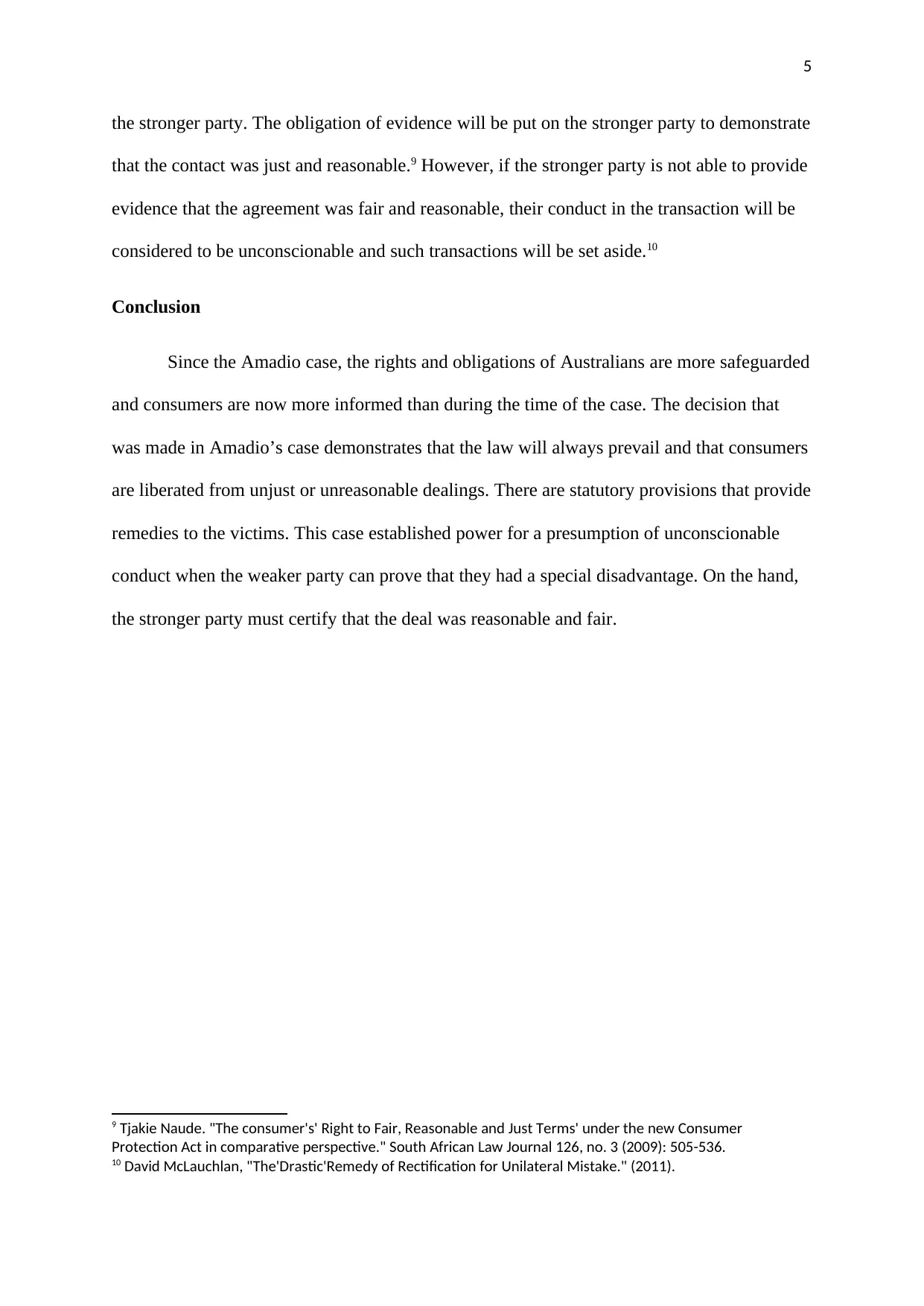
5
the stronger party. The obligation of evidence will be put on the stronger party to demonstrate
that the contact was just and reasonable.9 However, if the stronger party is not able to provide
evidence that the agreement was fair and reasonable, their conduct in the transaction will be
considered to be unconscionable and such transactions will be set aside.10
Conclusion
Since the Amadio case, the rights and obligations of Australians are more safeguarded
and consumers are now more informed than during the time of the case. The decision that
was made in Amadio’s case demonstrates that the law will always prevail and that consumers
are liberated from unjust or unreasonable dealings. There are statutory provisions that provide
remedies to the victims. This case established power for a presumption of unconscionable
conduct when the weaker party can prove that they had a special disadvantage. On the hand,
the stronger party must certify that the deal was reasonable and fair.
9 Tjakie Naude. "The consumer's' Right to Fair, Reasonable and Just Terms' under the new Consumer
Protection Act in comparative perspective." South African Law Journal 126, no. 3 (2009): 505-536.
10 David McLauchlan, "The'Drastic'Remedy of Rectification for Unilateral Mistake." (2011).
the stronger party. The obligation of evidence will be put on the stronger party to demonstrate
that the contact was just and reasonable.9 However, if the stronger party is not able to provide
evidence that the agreement was fair and reasonable, their conduct in the transaction will be
considered to be unconscionable and such transactions will be set aside.10
Conclusion
Since the Amadio case, the rights and obligations of Australians are more safeguarded
and consumers are now more informed than during the time of the case. The decision that
was made in Amadio’s case demonstrates that the law will always prevail and that consumers
are liberated from unjust or unreasonable dealings. There are statutory provisions that provide
remedies to the victims. This case established power for a presumption of unconscionable
conduct when the weaker party can prove that they had a special disadvantage. On the hand,
the stronger party must certify that the deal was reasonable and fair.
9 Tjakie Naude. "The consumer's' Right to Fair, Reasonable and Just Terms' under the new Consumer
Protection Act in comparative perspective." South African Law Journal 126, no. 3 (2009): 505-536.
10 David McLauchlan, "The'Drastic'Remedy of Rectification for Unilateral Mistake." (2011).
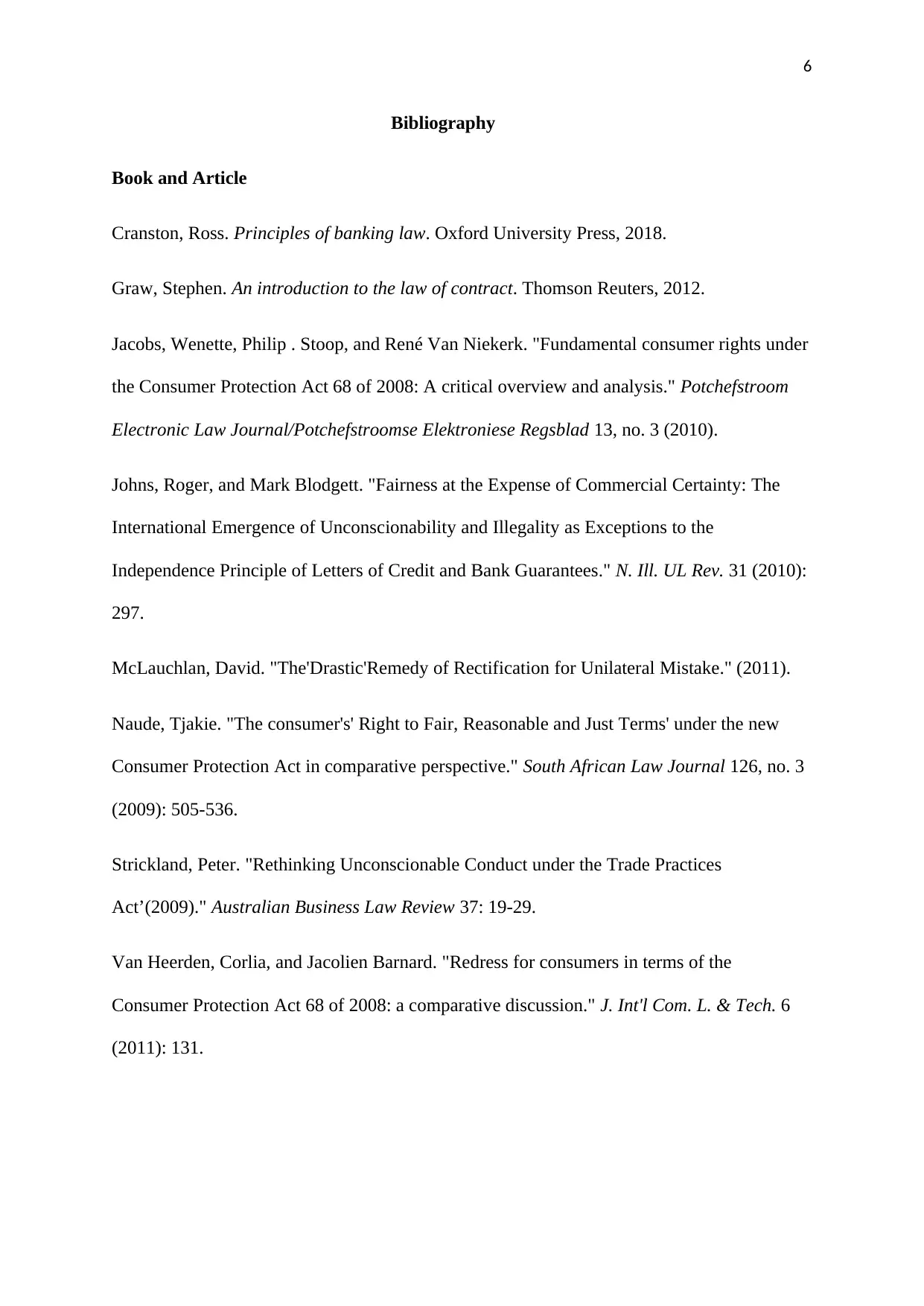
6
Bibliography
Book and Article
Cranston, Ross. Principles of banking law. Oxford University Press, 2018.
Graw, Stephen. An introduction to the law of contract. Thomson Reuters, 2012.
Jacobs, Wenette, Philip . Stoop, and René Van Niekerk. "Fundamental consumer rights under
the Consumer Protection Act 68 of 2008: A critical overview and analysis." Potchefstroom
Electronic Law Journal/Potchefstroomse Elektroniese Regsblad 13, no. 3 (2010).
Johns, Roger, and Mark Blodgett. "Fairness at the Expense of Commercial Certainty: The
International Emergence of Unconscionability and Illegality as Exceptions to the
Independence Principle of Letters of Credit and Bank Guarantees." N. Ill. UL Rev. 31 (2010):
297.
McLauchlan, David. "The'Drastic'Remedy of Rectification for Unilateral Mistake." (2011).
Naude, Tjakie. "The consumer's' Right to Fair, Reasonable and Just Terms' under the new
Consumer Protection Act in comparative perspective." South African Law Journal 126, no. 3
(2009): 505-536.
Strickland, Peter. "Rethinking Unconscionable Conduct under the Trade Practices
Act’(2009)." Australian Business Law Review 37: 19-29.
Van Heerden, Corlia, and Jacolien Barnard. "Redress for consumers in terms of the
Consumer Protection Act 68 of 2008: a comparative discussion." J. Int'l Com. L. & Tech. 6
(2011): 131.
Bibliography
Book and Article
Cranston, Ross. Principles of banking law. Oxford University Press, 2018.
Graw, Stephen. An introduction to the law of contract. Thomson Reuters, 2012.
Jacobs, Wenette, Philip . Stoop, and René Van Niekerk. "Fundamental consumer rights under
the Consumer Protection Act 68 of 2008: A critical overview and analysis." Potchefstroom
Electronic Law Journal/Potchefstroomse Elektroniese Regsblad 13, no. 3 (2010).
Johns, Roger, and Mark Blodgett. "Fairness at the Expense of Commercial Certainty: The
International Emergence of Unconscionability and Illegality as Exceptions to the
Independence Principle of Letters of Credit and Bank Guarantees." N. Ill. UL Rev. 31 (2010):
297.
McLauchlan, David. "The'Drastic'Remedy of Rectification for Unilateral Mistake." (2011).
Naude, Tjakie. "The consumer's' Right to Fair, Reasonable and Just Terms' under the new
Consumer Protection Act in comparative perspective." South African Law Journal 126, no. 3
(2009): 505-536.
Strickland, Peter. "Rethinking Unconscionable Conduct under the Trade Practices
Act’(2009)." Australian Business Law Review 37: 19-29.
Van Heerden, Corlia, and Jacolien Barnard. "Redress for consumers in terms of the
Consumer Protection Act 68 of 2008: a comparative discussion." J. Int'l Com. L. & Tech. 6
(2011): 131.
⊘ This is a preview!⊘
Do you want full access?
Subscribe today to unlock all pages.

Trusted by 1+ million students worldwide

7
Cases
Commercial Bank of Australia Ltd v Amadio (1983) 151 CLR 447.
Cases
Commercial Bank of Australia Ltd v Amadio (1983) 151 CLR 447.
1 out of 7
Related Documents
Your All-in-One AI-Powered Toolkit for Academic Success.
+13062052269
info@desklib.com
Available 24*7 on WhatsApp / Email
![[object Object]](/_next/static/media/star-bottom.7253800d.svg)
Unlock your academic potential
Copyright © 2020–2026 A2Z Services. All Rights Reserved. Developed and managed by ZUCOL.





